[Click to enlarge]
That Blackguard
Winston Churchill
The Barnes Review — 2012 January – February
ILLUSTRATION: RICHARD COLE I DRAWN & QUARTERED/NEWSCOM
& KATANA
THE ARTICLE IS EXCERPTED FROM A BOOKLET boldly entitled That Bastard Churchill, by patriotic writer Maj. M.E Thurgood. It is a blistering expose of Winston Churchill’s lack of humanity and chivalry in war, his bad temper and bizarre habits, and his insatiable lust for alcohol — washed down with a good dose of Christian blood. Decades of propaganda have millions of people believing Churchill was some kind of an English savior when, in fact, he was the architect of the destruction of the British empire.
By MAJOR MERVYN F. THURGOOD
[Image] A young Winston Churchill (1881).
Winston Leonard Spencer Churchill was born in 1874, son of Lord Randolph Churchill, the third son of the duke of Marlborough. Winston Churchill was educated at Harrow and after three attempts gained entrance to Sandhurst Military College. His forte was English, but he was innumerate and graduated near the foot of his class.
[Image] Winston Churchill entered Sandhurst in 1893 as a cavalry cadet.
While at Sandhurst, he was accused of committing an act of gross immorality of the “Oscar Wilde” type. Churchill brought suit against the father of one of the cadets who accused him, A. C. Bruce-Pryce. The charges were withdrawn, and Churchill received 400 pounds in damages. No sooner was that incident over than Churchill became involved in a steeplechase fraud, and he and his cohorts became the target of a tabloid called Truth.
[Image] December 1894 at the age of 20, Winston left Sandhurst as a cavalry officer in the 4th Hussars.
In 1895, Churchill and a friend, Reginald Barnes, went to Cuba and spent some six weeks with the Spanish forces, sending daily reports to the Daily Graphic.
[Image] The Graphic was a British weekly illustrated newspaper, first published on 4 December 1869 by William Luson Thomas’s company Illustrated Newspapers Limited.
In 1895, Churchill, and fellow officer Reginald Barnes, travelled to Cuba to observe the Spanish fight the Cuban guerrillas; he had obtained a commission to write about the conflict from the Daily Graphic.
Churchill become more interested in being a writer than a soldier but realized that the army would be a good foundation for political life and joined the Malakand Field Force on the North West Frontier and on occasion enjoined in skirmishes with Afridis, who, despite Churchill’s reports of heavy fighting, only threw stones at the British. Churchill’s next military exploit was in 1898 at Omdurman with the 21st Lancers under Kitchener, advancing on Khartoum. Here again his military energies were directed to writing for the Times and the Morning Post.
Lord Kitchener was to say of him that he had grit enough but only used the army as a convenience and could secure postings that would suit his purpose through his mother. He served in South Africa for part of a year, from 1899 to 1900, as a war correspondent, and his claim to fame was that he had been taken prisoner and had escaped. [1]
[Image] Winston Churchill (right with hands behind his back). Picture taken three days after his capture by the Boers.
[Image] When Churchill escaped from the PoW camp, a wanted poster was issued, offering £25 (dead or alive) for his recapture.
He was elected MP for Oldham as a Conservative in 1900 at the age of 26, but joined the Liberals in 1904 and attained cabinet rank: as president of the Board of Trade in 1908. He became home secretary in 1910 and was made first lord of the Admiralty in 1911. Which of course, brings to mind Gilbert and Sullivan’s HMS Pinafore,:
“Stick close to your desk and never go to sea, and you may be the leader of the queen’s na-vee!”
[Image] Winston Churchill rather enjoyed war.
In July 1914, as Britain prepared for the oncoming catastrophe, Churchill, at the time the First Lord of the Admiralty, wrote to his wife;
‘I am interested, geared up and happy. Is it not horrible to be built like that?’
And in 1916, in a letter to David Lloyd George’s daughter, Churchill admitted:
“I think a curse should rest on me — because I love this war. I know it’s smashing and shattering the lives of thousands every moment, and yet, I can’t help it, I enjoy every second of it’.
In his capacity as first lord of the Admiralty, he devised a plan to bring support to the Russians by opening up the Dardanelles by the army, using mostly colonials, the ANZACs. The attack on Gallipoli was a disaster, and it was here that Churchill blotted his copybook. But far deeper and more sinister was his role in the sinking of the Lusitania on May 8, 1915.
Churchill was linked with the then-undersecretary of the U.S. Navy, Franklin D. Roosevelt, in a conspiracy to bring America into the war by sinking the Cunard liner out of New York. Twice the German Embassy in New York issued warnings in the U.S. press against sailing on the ill-fated liner, which, the Germans claimed was carrying contraband and munitions and was being converted to an armed merchant ship. It was also known that it would be carrying about one company of soldiers, field guns and ammunition.
[Image] RMS LUSITANIA, (named after the old Roman Empire’s name for the province which is now called Portugal). RMS Lusitania was a British ocean liner, holder of the Blue Riband and briefly the world’s biggest ship. She was launched by the Cunard Line in 1907, at a time of fierce competition for the North Atlantic trade. In 1915 she was hit by one torpedo by a German U-boat. Subsequently the munitions the ship was secretly carrying exploded causing the deaths of 1,198 passengers and crew.
[Image] (Left) The official warning issued by the Imperial German Embassy about travelling on Lusitania.
(Right) A poster urging Irishmen to avenge the sinking of the Lusitania.
On 17 April 1915, Lusitania left Liverpool on her 201st transatlantic voyage, arriving in New York on 24 April. A group of German–Americans, hoping to avoid controversy if Lusitania were attacked by a U-boat, discussed their concerns with a representative of the German Embassy. The embassy decided to warn passengers before her next crossing not to sail aboard Lusitania. The Imperial German Embassy placed a warning advertisement in 50 American newspapers, including those in New York:
NOTICE!
TRAVELLERS intending to embark on the Atlantic voyage are reminded that a state of war exists between Germany and her allies and Great Britain and her allies; that the zone of war includes the waters adjacent to the British Isles; that, in accordance with formal notice given by the Imperial German Government, vessels flying the flag of Great Britain, or any of her allies, are liable to destruction in those waters and that travellers sailing in the war zone on the ships of Great Britain or her allies do so at their own risk.
IMPERIAL GERMAN EMBASSY
Washington, D.C., April 22, 1915.
————————————————————-
It was normal procedure for all such liners to be escorted from the south coast of Ireland to Liverpool by at least one light cruiser and two destroyers. On the 6th of May, Capt. W.T. Turner received warning of submarines along the south coast of Ireland, and he expected to be diverted around the north coast of Ireland. The first lord of the Admiralty didn’t normally concern himself with such things, but Churchill issued orders that the Lusitania was not to be escorted to Liverpool. He then left for Paris and signed himself in at his hotel as Mr. L. Spencer.
[Image] Commander William Thomas Turner (1856 – 1933) was the captain of the Lusitania when it sunk in May 1915. Pictured here aboard the Aquitania, 1914.
At 2:12 pm on May 8 Capt. [Walther] Schwieger, commanding the submarine U-20, fired his last torpedo into the bow of the Lusitania. He witnessed two distinct explosions, as did others.
[Image] Walther Schwieger (7 April 1885, Berlin – 5 September 1917, North Sea) was an officer of the Imperial German Navy (Kaiserliche Marine) and a U-boat commander during World War I, noted for his role in the sinking of the RMS Lusitania.
The Lusitania was unsinkable and had double hulls, but it went down in 20 minutes. The inquiry stated that the second explosion came from coal dust, but recent investigations indicate that there would be little coal dust, and it was very unlikely it would be in the forward hold, and that the second explosion could only have come from several tons of explosive carried in the forward hold.
By 2:33 pm the Lusitania was gone, taking with her 1,198 of her passengers and crew including 171 influential Americans. The liner went down 10 miles off Kinsale Head within sight of Queenstown (Ireland). But patrol boats remained in the harbor until it was too late to help.
The official inquiry skirted many issues, including the role played by Churchill and possibly Roosevelt. Churchill always thought that he had a friend in Roosevelt, who in fact despised the man and his “decadent” empire.
True to Kitchener’s predictions, Churchill used the army as a convenience and enlisted as a major in the Queen’s Own Oxfordshire Hussars on the 18th of November, 1915. On his arrival in France he was taken to Sir John French, who offered him a promotion to brigadier general, to command a brigade. This did not delight the ears of Prime Minister Asquith, and French decided to send Churchill to the 2nd Battalion Grenadier Guards for experience in the trenches. Churchill only spent five days with the guards. On his leaving, the colonel would comment:
“We don’t want to be in any way inhospitable, but I think it only right to say that your coming was not a matter in which we were given any choice.”
[Image] Churchill, centre, in army uniform with colleagues.
Churchill meandered from headquarters to headquarters, looking for a command, hoping to eventually command a brigade. His desire to command would manifest itself with sad results in World War II. On New Year’s Day, 1916, he was given command of the 6th Bn. Royal Scots Fusiliers. During his three and one-half months in command, his unit was in no threat, and he spent most of his time working on his parliamentary duties. He saw no more of the trenches after the 6th of May 1916, and on the 22nd of July 1917, he became minister of munitions. Again the army had served him well.
Churchill always thought that he had a friend in Roosevelt, who in fact despised the man and his “decadent” empire.
Churchill’s political fortunes waxed and waned through the war, and his attempts to support the white Russians received no support from the trench weary soldiers who were now becoming disenchanted with the aristocracy of all countries. In 1922, he became colonial secretary in the Middle East and inspired by his American mother’s Jewish background, played a major role in supporting the Balfour Declaration that betrayed Britain’s Arab allies and allowed massive immigration of Jews into Palestine. He wrote Zionism is an “inspiring movement,” saying:
“If, as may well happen, there should be created, in our lifetime, by the banks of the Jordan, a Jewish state under protection of the British crown, which might comprise 3 to 4 million Jews, an event will have occurred in the history of the world which, from every point of view, would be beneficial and would be especially in harmony with the truest interests of the British empire.”
He would live to see Jewish immigration into Palestine, and on July 22, 1946, the Jewish Stern Gang blew up the King David Hotel, the headquarters of the 6th Airborne Division, killing 91 men who had jumped into Normandy to free the Jewish people.
[Image] July 2, 1946: The King David Hotel in Jerusalem was bombed by jews, killing 91 people. Menachem Begin planned the destruction of the King David Hotel and the massacre of Deir Yassin. Ex-prime minister, Shamir, was originally a member of the Jewish terrorist gang called Irgun, which was headed by none other than Menachem Begin. Shamir later moved over to the even more radical “Stern Gang,” which committed many vicious atrocities.
On the March 27, Churchill tried to bribe the Emir Abdulla to allow the Jews to immigrate into Palestine but he was warned by Abdulla that the aim of the Zionists was to establish a Jewish state in Palestine and gradually control the entire world, and the British might have to call on Germany or Russia for some help.
As colonial secretary, Churchill got his first indication that the colonies were coming of age and would no longer be blindly subservient to Britain’s call. This he would ignore. First Canada asked Churchill if his aim was to give the Jews control of the government in Palestine. To this Churchill replied that if they become the majority, as he wished, naturally they would take it over. In 1922, Britain, primarily through Churchill, became involved with Turkey over the Gallipoli Peninsula and the Dardanelles. On Sept. 9, the Turks entered Smyrna, and Greek rule in Asia Minor came to an end. The 1,000 British troops on the Asiatic side of the Dardanelles were to withdraw to the Gallipoli Peninsula from Canakkale but later remained by orders from the local commander.
Both Lloyd George and Churchill supported the decision to keep the Turks out of Europe. Churchill sent a telegram to all the dominion governments to “dispatch military reinforcements.”
[Image] Lloyd George and Churchill (1922)
The dominions varied in acceptance of Churchill’s demand. Newfoundland and New Zealand offered their support, but both the Canadian and Australian governments were furious at not even being consulted before the request was made public, and at the request itself. The Australian prime minister [Billy Hughes] telegraphed London, saying:
“In a good cause we are prepared to venture our all, in a bad one, not a single man!”
Canada would send no troops at all. Churchill never got the true implications of these refusals and later as prime minister, still felt that he had absolute command over his “colonial troops.”
[Image] General Strike, May 1956 at Stratford Broadway.
Churchill again surfaced as one who cared little for the common Englishman. It was during the general strike of May 1926, when he was chancellor of the Exchequer (minister of finance), and editor of the British Gazette. It was only his paper that appeared on the streets during the strike, in which he referred to the strikers as the enemy and demanded unconditional surrender. That same demand would prolong the war with Germany and his anti-union, anti-labor attitude would be the basis for escalating strikes and sabotage in war industries and turn him out of office in the 1945 elections. Again as chancellor of the Exchequer he turned down proposals for better schools and housing for the people Britain. He would continue to display one of his worst qualities: as described by Lord Milner in a letter to Herbert Samuel:
“He was too apt to make up his mind without sufficient knowledge.”
Out of office Churchill continued to run up debts, and, because of Milner’s observation, he became involved in libel suits. Churchill had commented to his personal secretary, Martin Gilbert [Jewish]:
“Give me the facts, and I will twist them the way I want, to suit my argument.”
His comment was the subject of Antony Cave-Brown’s two volumes, Bodyguard of Lies.
Though he had been minister of finance, Churchill could not control his own personal finances and was always in debt. It was through his drinking, debt and his Jewish mother that he became involved and beholden to a group that would eventually become known as Focus.
It first began with the president of the Anglo-Jewish Association, Leonard Montefiore, who found in Churchill a perfect spokesman for his association, a man well known, with connections, a Zionist and in debt. Montefiore approached Churchill with the plight of the Jews in Germany the Jews shared the same “plight” in nearly all countries in Europe. Churchill agreed to support the association despite the fact that Churchill had previously pushed for an Anglo German Entente. The Anglo-Jewish Association later became known as the Anti-Nazi Council. So it was not surprising that both the members of the National Socialist German Worker’s Party (the Nazis) and the German people, as a whole, took umbrage with foreigners of a certain ethnic background, interfering in strictly domestic German affairs.
[Image] LEONARD G. MONTEFIORE, O .B .E .
The name “Anti-Nazi Council” became offensive to many Britons, and the name was changed to “The Focus” under Sir Henry Wickham Steed. The change of name brought many people of different political as well as ethnic cultures together. Some of the new members were Sir Walter Citrine of the Trades Union Congress up to Sir Robert Waley-Cohen, the chairman of Shell Oil. As Focus grew it recruited both labor and management, Jew and non-Jew, including Josiah Wedgewood, Sir Henry Strakosch, a South African mining multimillionaire and chairman of Union Corp. Ltd. and a Jew, born in Moravia.
[Image] Sir Robert Waley Cohen, KBE (8 September 1877 – 27 November 1952) was a British industrialist and prominent leader of Anglo-Jewry.
Other members were Dr. Chaim Weizmann, of whom we will hear much more, David Ben Guirion, Simon Marks and Israel Moses Sief of Marks and Spencer, Lord Melchett and Nathan Laski — to mention a few. It is of interest to note that Capt. Basil Liddel-Hart, the noted strategist and military writer, was a member, though he was not a Jew.
As Churchill’s debts grew, he wrote for many Jewish-dominated newspapers but couldn’t cover his living expenses. To make matters worse, he was sued for libel by the American tabloid The Enquirer for $200,000. He now put up the family estate “Chartwell” for sale. His debts and libel problem were met by his Jewish friend Sir Henry Strakosch and other members of Focus. He was now not only beholden to, but also under the control of this Anti-Nazi Council and now all his speeches and writings were directed against the threat of Hitler and the ill treatment of the Jews by the Nazis.
[Image] Chartwell was the principal adult home of Sir Winston Churchill. Churchill and his wife Clementine bought the property, located two miles south of Westerham, Kent, England, in 1922. (Note: the menorah in the garden is not really there.)
Once again Churchill displayed “Milner’s observation” during the Munich Crisis, where he saw an opportunity to go to war with Adolf Hitler. He gave little thought to the state of training and the geographic location of the British Regular Army, and his only plan was to bring France and the dominions into the war to fight the land battles and eventually bring the United States into war with Germany. Both Chamberlain and Sir Leslie Hore-Belisha knew the true state of readiness of Britain’s armed forces, which were in no condition to fight.
But more important, Churchill gave little thought to the fact that Poland had been at war with Czechoslovakia for some 10 years over the Teschen province. He overlooked the fact that if Russia were to come to the aid of Czechoslovakia, it would have to invade either Poland or Romania, or both, and that Britain had treaties with both countries if they were attacked. The result of which would be that Britain and Germany would be fighting Russia, and Churchill did not consider the possible actions of the new Axis partner, Japan. Nor did he see that, apart from a strong desire for peace, most countries saw Hitler as a bulwark against Stalin.
Germany ended up being surrounded by a mob of squabbling, unstable states with each containing large masses of Germans.
But still Churchill condemned Chamberlain for not going to war with Hitler over the Sudetenland. Only after the destruction of Germany did he realize the real threat when he commented to Gen. Hastings Lionel “Pug” Ismay (first baron Ismay):
“We’ve killed the wrong pig!”
But somehow Winnie would get his war and satisfy his benefactors.
Both the media and Churchill chose to misrepresent Chamberlain’s actions at Munich. But by the end of September 1938, the Poles had invaded Teschen, as the Germans marched into Sudetenland, which was some 90% German ethnically and a product of Woodrow Wilson. The rest of Czechoslovakia was dissected by her neighbors, including Hungary. Alfred Duff-Cooper, a staunch Zionist and member of Focus, resigned as first lord of the Admiralty in protest for Chamberlain not having gone to war with Germany (and possibly Poland), over Sudetenland.
[Image] Churchill and Duff Cooper
Churchill looks over the shoulder of Alfred Duff Cooper, the Minister of Information. Cooper, Churchill’s friend and political ally, was brought back into the Cabinet after his very public resignation as First Lord of the Admiralty in protest at Chamberlain’s policy on Czechoslovakia. He later became the liaison with the Free French forces and was Ambassador to France following the liberation in 1944.
By the end of March 1939, Czech troops marched into Bratislava, Slovakia and deposed the president, Father Jozef Tiso, while Slovakia and Ruthenia declared their independence from the state created by the League of Nations and about which David Lloyd George was to say:
“I cannot conceive any greater cause of a future war than that the German people should be surrounded by a mob of small states, many of them consisting of peoples who have never previously set up stable governments by themselves, but each of them containing large masses of Germans.”
Through fear of civil war, President of the Second Czechoslovakian Republic Dr. Emil Hacha signed an agreement (March 15, 1939) making a German Protectorate of Moravia and Bohemia. Hungarian troops crossed the Ruthenian border, driving out the Czech units. This mess was played down by the British media as well as Germany’s offer of Slovakia to Poland, for the Port of Danzig.
The news that the people of Britain, the dominions and in fact all the world heard was that Hitler had occupied all of Czechoslovakia.
Though all members of the League of Nations agreed that the Polish Corridor rightly belonged to Germany, Churchill would organize a mutiny within Neville Chamberlain’s caucus to demand that Britain go to war over Poland, even though Austen Chamberlain, the British foreign secretary, had said that the Polish corridor was not worth one British corporal. But Churchill and Focus saw it as a chance to destroy Hitler. Polish independence was the last thing on their minds, especially after Poland had invaded Czechoslovakia, for which Churchill demanded war.
The last thing the people of Britain and France wanted was another bloodbath over some distant and unknown land. But through Focus and Churchill, both Britain and France and later the world, would be dragged into a war nobody wanted and that would solve nothing.
[Image] Newspaper headlines when Britain and soon to follow, France, declare war on Germany.
On Sept. 3, 1939, Britain declared war on Germany, and Churchill was made first lord of the Admiralty. He arranged to have a signal flashed to all ships in the Royal Navy, “Winston is Back.” But there was no joy throughout the fleet at Churchill’s appointment. Churchill behaved as though he had been made “secretary of state for war” and began issuing orders to the other armed services. His first act as first lord was to issue orders to the Royal Air Force to attack the German naval bases at Wilhemshaven and Brunsbuttel.
Here is the record; 29 Blenheims and Wellingtons attacked; 10 bombers failed to find their targets and returned to base; one plane bombed Esbjerg, a town in Denmark some 110 miles from their target, three planes attacked their own “men-of-war” in the North Sea; seven were shot down by German flak; eight bombers found their targets and attacked the battleship Von Scheer with three unprimed bombs, doing no damage. They scored several hits on the cruiser Emden, the only real damage being done when a plane crashed on the ship. The marksmanship of the RAF improved very little over the next two years.
———————————-
MAJ. MERVYN F. THURGOOD is the author of To Punish the Hostiles and the editor of A Symposium on World War II. He is also author of a much longer version of this article entitled That Bastard Churchill, Born in 1923 in British Columbia, Thurgood served with the Seaforth Highlanders Canadian infantry regiment.
Winnie the War Criminal:
A Synopsis of Atrocities Ordered by Mr. Churchill
Winston Churchill planned and committed war crimes, trashing the rules of “civilized” warfare that had been developed over the centuries in the Western world.
At the Second Quebec Conference (September 16, 1944), Churchill and fellow monster Franklin D. Roosevelt adopted the sinister Morgenthau Plan, which would have killed tens of millions of Germans, giving the Germans a terrifying picture of what “unconditional surrender” would mean in practice. Germans would be robbed of East Prussia, Upper Silesia and all of western Germany, and the remainder would be split into separate northern and southern nations.
Churchill was convinced the plan would;
“save Britain from bankruptcy by eliminating a dangerous competitor.”
Estimating that millions would die immediately by inhalation, and millions more would succumb later, Churchill contemplated dropping tens of thousands of anthrax bombs on the civilian population and ordered detailed planning for a chemical attack on six major German cities.
His greatest war crimes involved the carpet-bombing of German cities that killed 600,000 civilians and left some 800,000 injured. [Note: approximately 40,000 British were killed during The Blitz] Churchill lied to the House of Commons and the public, claiming only military and industrial installations were targeted, whereas the real aim was to kill as many civilians as possible.
A thousand-year-old urban culture was annihilated, as great cities, famed in the annals of science and art, were reduced to smoldering ruins. Churchill and Roosevelt were destroying more than Attila the Hun.
Dresden was filled with refugees running for their lives from the Red Army. The war was practically over. But for three days and nights, from February 13 to 15, 1945, British bombs rained down on the defenseless city, killing 135,000 people or more.
The bombing of Germany and killing of civilians continued as late as the middle of April 1945, only stopping because there were no more targets left to be bombed.
— JOHN TIFFANY
———————————-
Footnotes
[1] Here is a less “heroic” account of Churchill’s “escape” from the Boers taken from pages 44 – 46 of Hidden History — The Secret Origins of the First World War by Gerry Docherty and Jim Macgregor:
Winston Churchill had been sent to South Africa as a war correspondent for the conservative Morning Post in 1899 and ended up in a Boer prisoner-of-war camp. The story, and it was largely his, derives from Churchill’s autobiography. [57] According to his own account, he joined a reconnaissance mission aboard an armoured train on 15 November 1899 and was captured along with around 60 British officers and men when the Boers attacked it. Taken to Pretoria, they were held in an old school surrounded by a ten-foot-high corrugated-iron wall. Churchill gave an account of the derailment and his subsequent action in making a ‘daring escape‘ to other journalists. The Daily Telegraph printed a dispatch from Reuters headlined ‘Mr Churchill’s bravery and coolness is described as magnificent‘. The hero created himself.
What went unreported was that following his internment Churchill wanted himself classified as a non-combatant on the grounds that he was a journalist. He used his connections to send a begging letter to Alfred Milner on 24 November asking that he be included in a list of prisoners to be released and said that he had asked his mother to write to him through Milner. [58] He also submitted requests for his release on 26 November and 8 December, [59] and promised that ‘if I am released I will give any parole that I may be required not to serve against the Republican forces‘. [60] On 12 December, the Boer commander-in-chief agreed to release him, and some time thereafter Churchill was never seen again in the camp.
On his subsequent arrival in the Portuguese port of Lourenco Marques Churchill relayed an amazing adventure. He claimed to have cut through the fencing under the noses of the Boer guards and made a tortuous journey to freedom. His ‘daring escape‘ became the stuff of legend. On his own and unable to speak either Afrikaans or Kaffir, but bolstered by the surprisingly large sum of £75 (worth over £6,000 in today’s currency), he made the 250-mile journey to the safe haven of Lourenco Marques. His odyssey was worthy of any Greek hero of ancient myth. Crossing dangerous terrain and dodging the heavily armed Boer commandos who were out hunting for him, he eventually came to a railway track and leapt onto a train as it thundered past. This must have been accomplished with considerable difficulty, ‘partly because of his dislocated shoulder‘. [61]
In another fawning account, Churchill is said to have ‘hurled himself upon a truck, and after an agonising struggle managed to remain crouching on the couplings between two wagons‘. [62] Within a very short time, however, thirst forced him to leap off in search of water. Crawling on his belly, he dragged himself through swamps before coming across the Boer township of Witbank. He was unbelievably fortunate to knock on the door of ‘the only family for twenty miles where he would not have been handed over‘. [63] After three days in hiding, allegedly in the company of rats down a mineshaft, he got aboard another railway truck and concealed himself under bales of wool. It was the train to Delagoa Bay, freedom and ‘a blaze of triumph‘. [64] That is how Churchill told his story.
Controversy hung around his account like the rats in his mineshaft. There were accusations that he had behaved selfishly and badly by leaving on his own and creating such self-seeking publicity. Fortune and determined legal proceedings, however, seem to have removed such reservations. British officers in the camp, Captain Haldane, Sergeant Brockie, and Lieutenants le Mesurier and Frankland felt he had ruined their chances of freedom. Haldane’s claims were strengthened by his refusal to appear in court on Churchill’s behalf in a libel case against Blackwood’s Magazine in 1912. Despite these contrary voices, his ‘daring escape‘ turned Churchill into a public hero and gifted him a Conservative seat for Oldham in the parliamentary elections just a few months later.
___________________________
PDF Version History & Notes
Version 4: Jul 19, 2015 — Added footnote on Churchill’s “escape” from the Boers.
Version 3: Jul 18, 2015 — cartoon image updated
Version 2: Jul 18, 2015 — 2 images updated
Version 1: Published Jul 18, 2015
__________________
Notes
* Images not in the original document.
* Footnotes are not in the original document.
* Cover image is not part of the original document.
__________________
Knowledge is Power in Our Struggle for Racial Survival
(Information that should be shared with as many of our people as possible — do your part to counter Jewish control of the mainstream media — pass it on and spread the word) … Val Koinen at
======================================
Version History
Version 7: Feb 15, 2023 — Fixed image links.
Version 6: Sep 22, 2019 — Re-uploaded images and PDF for katana17.com/wp/ version..
Version 5: Dec 3, 2017 — Improved formatting.
Version 4: Jul 19, 2015 — Added footnote on Churchill’s “escape” from the Boers.
Version 3: Jul 18, 2015 — Updated 1 image.
Version 2: Jul 18, 2015 — Updated 2 images.

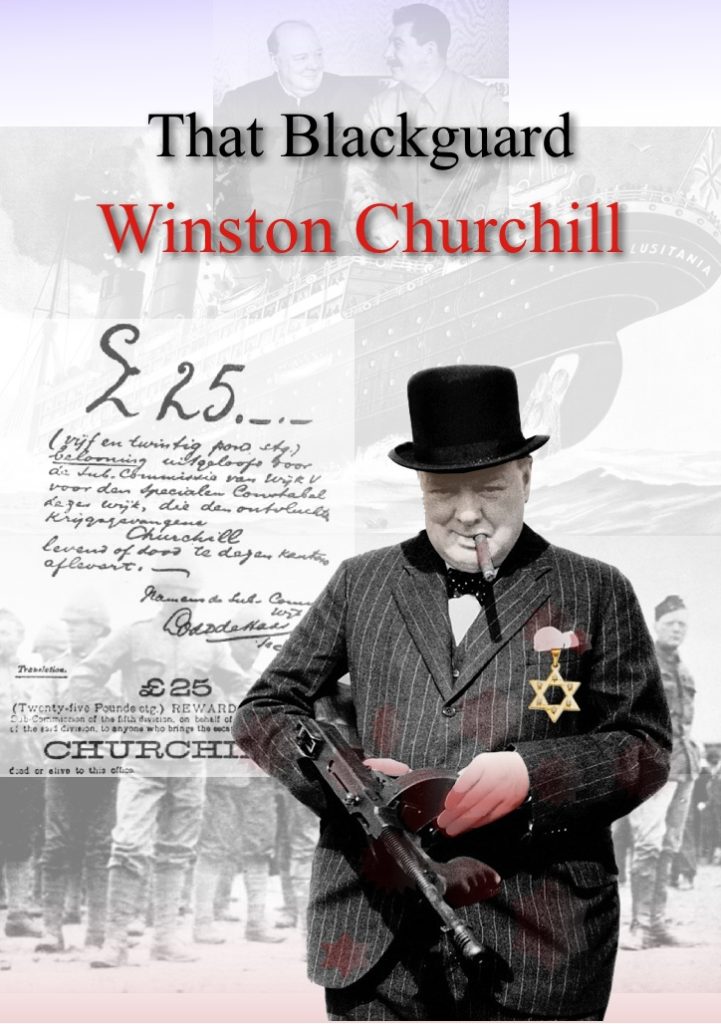
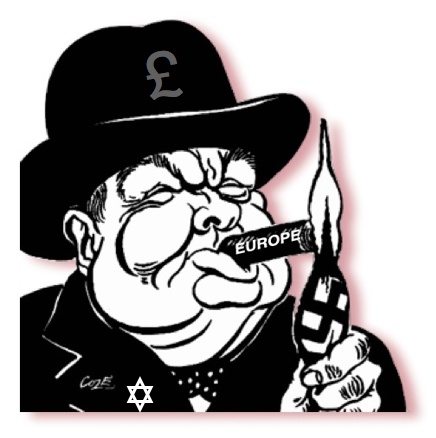
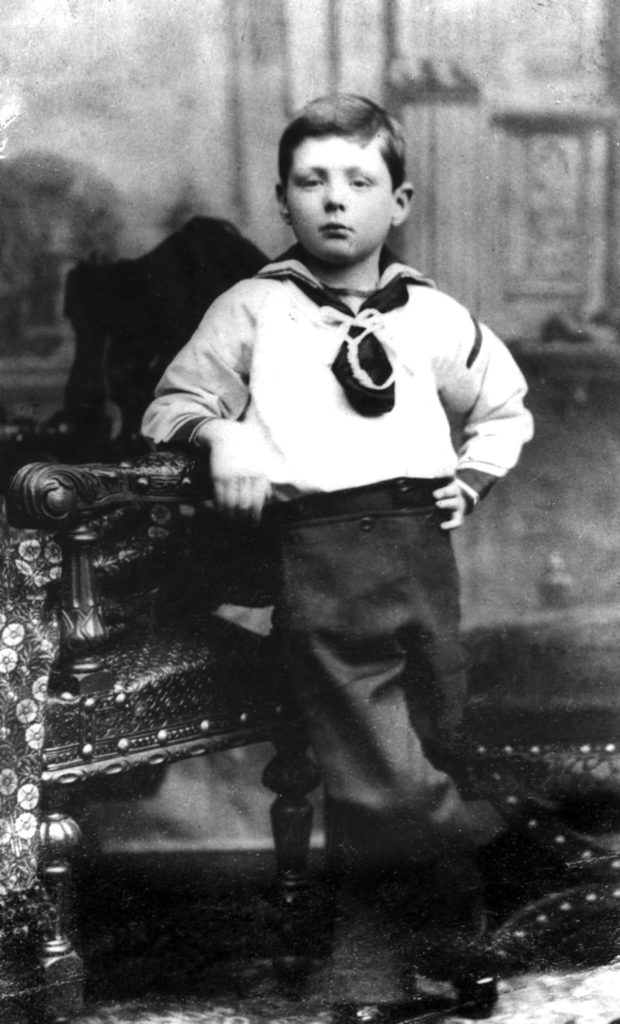
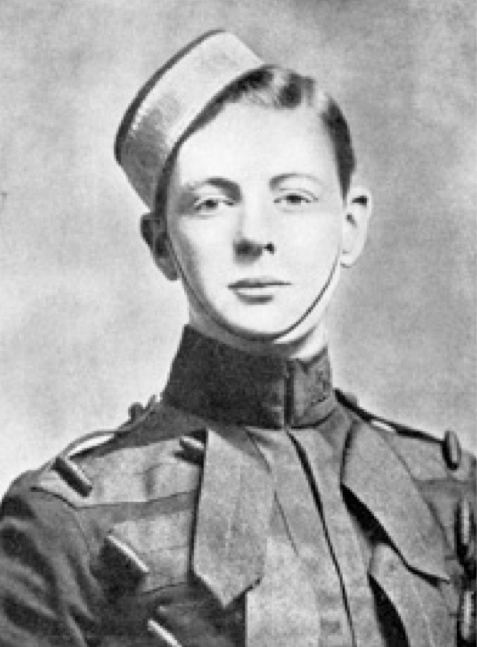
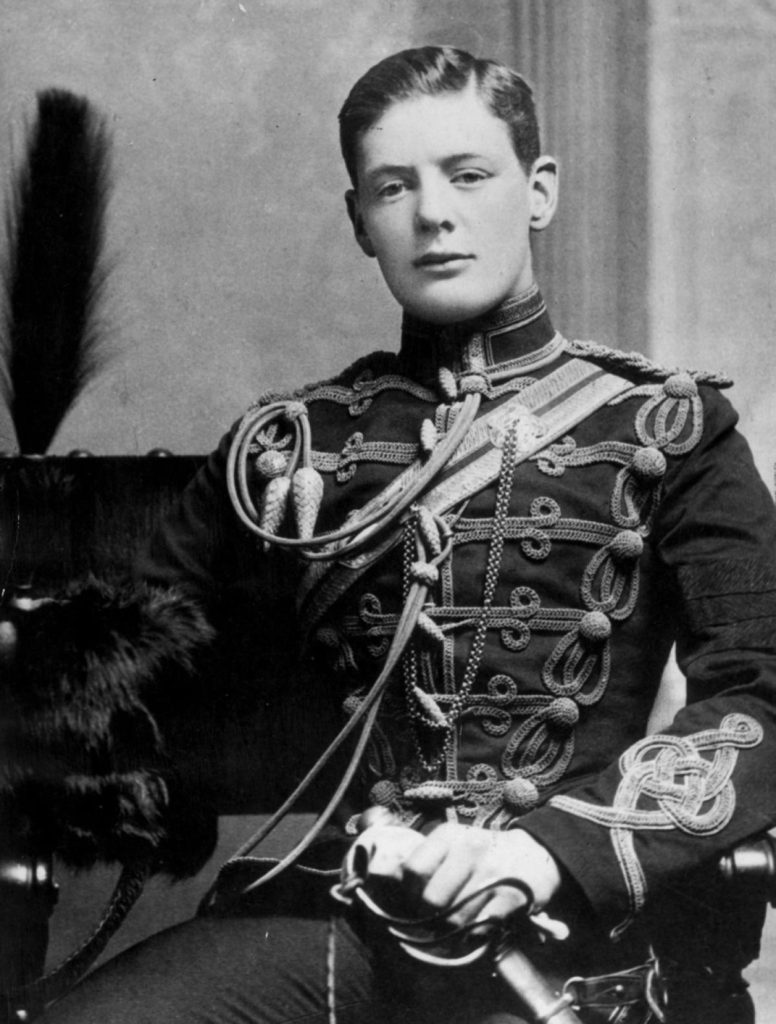
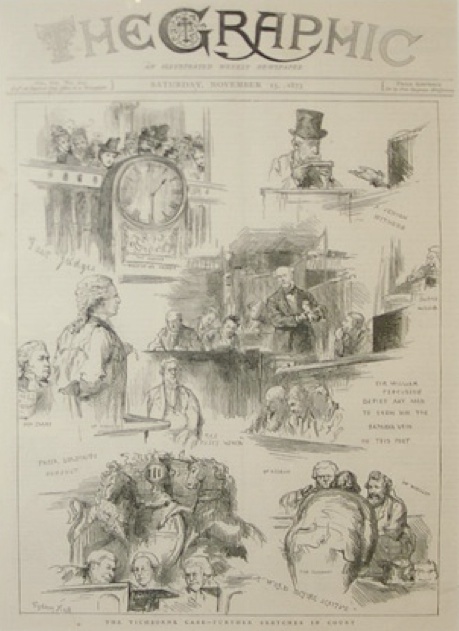
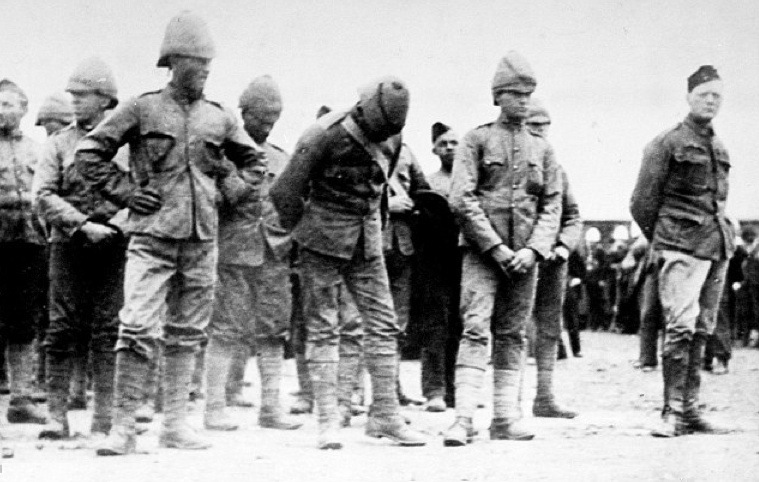
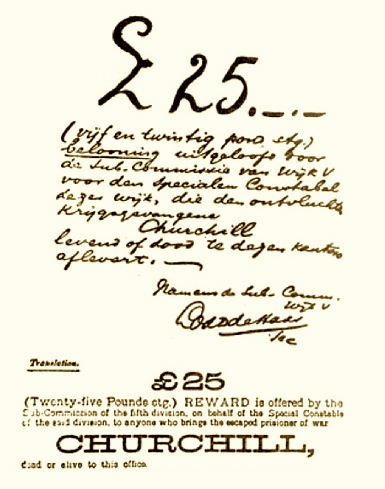
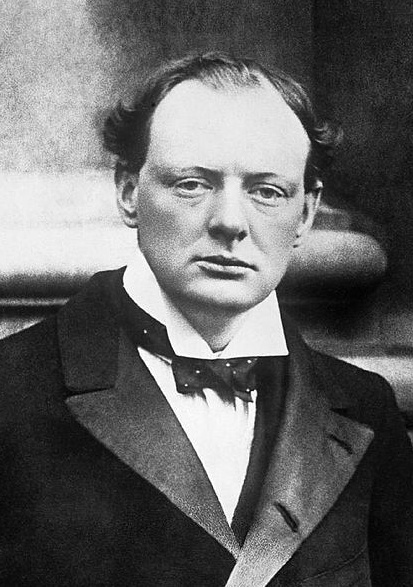
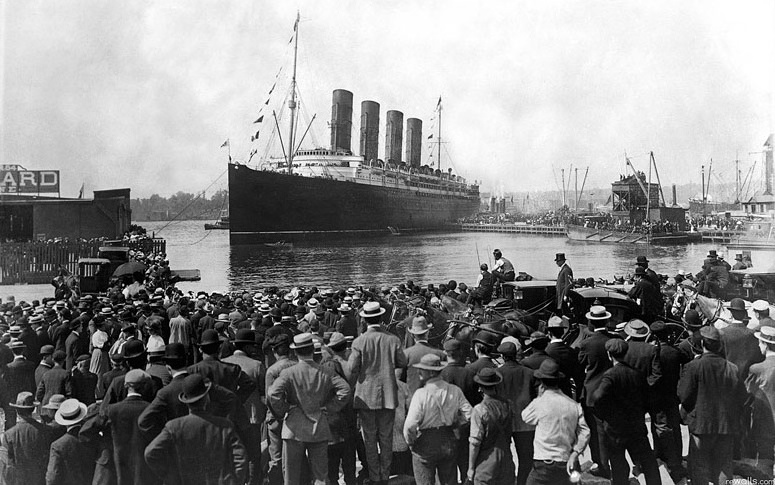
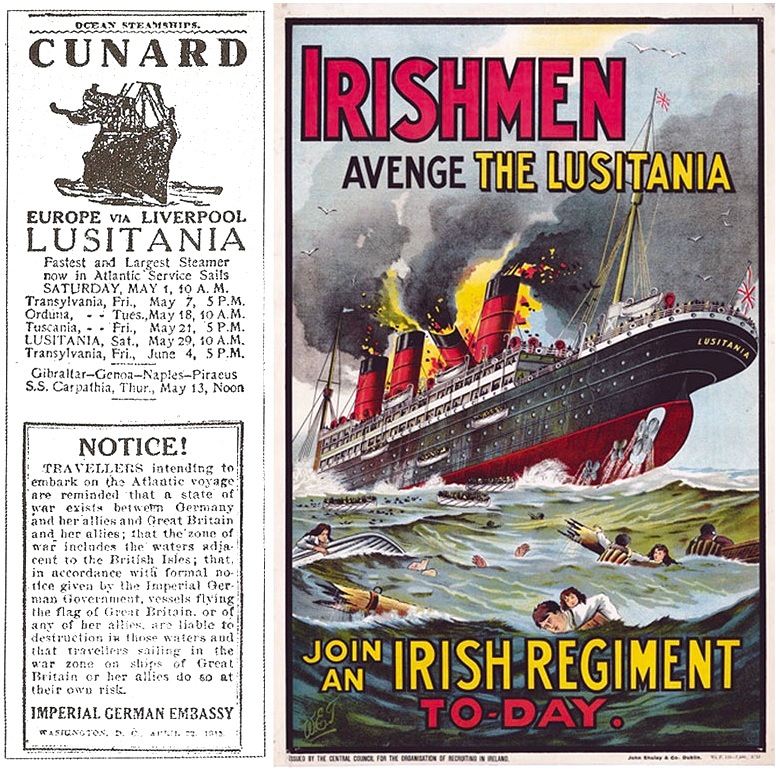
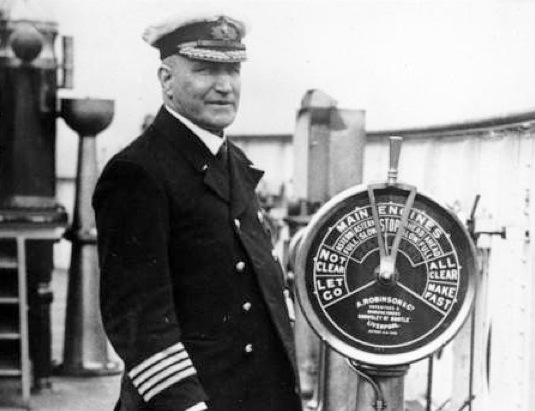
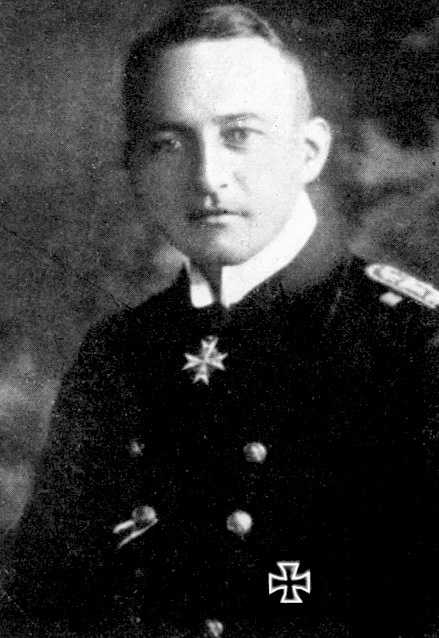
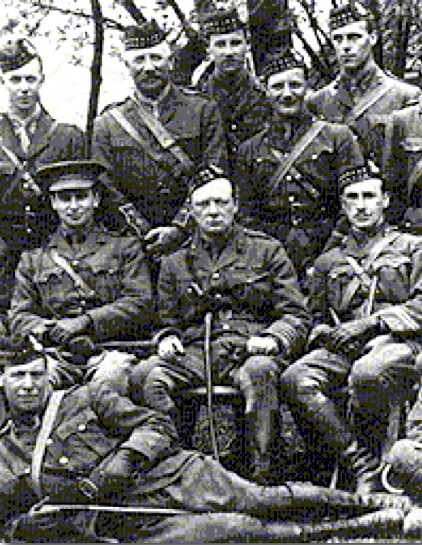
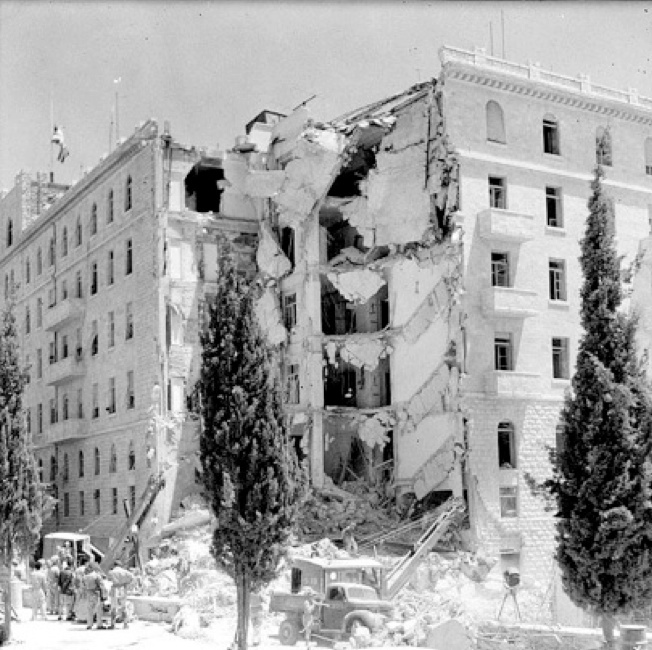
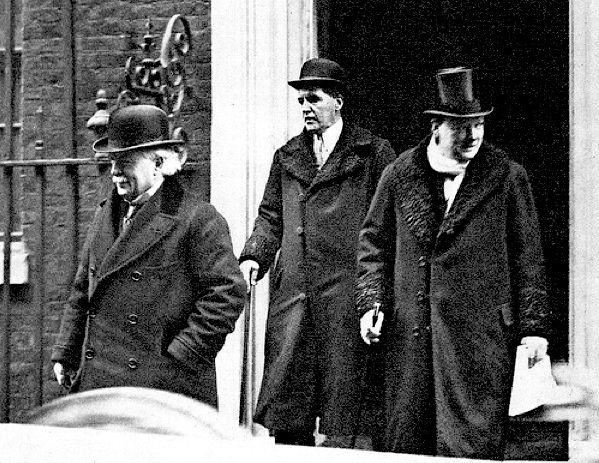
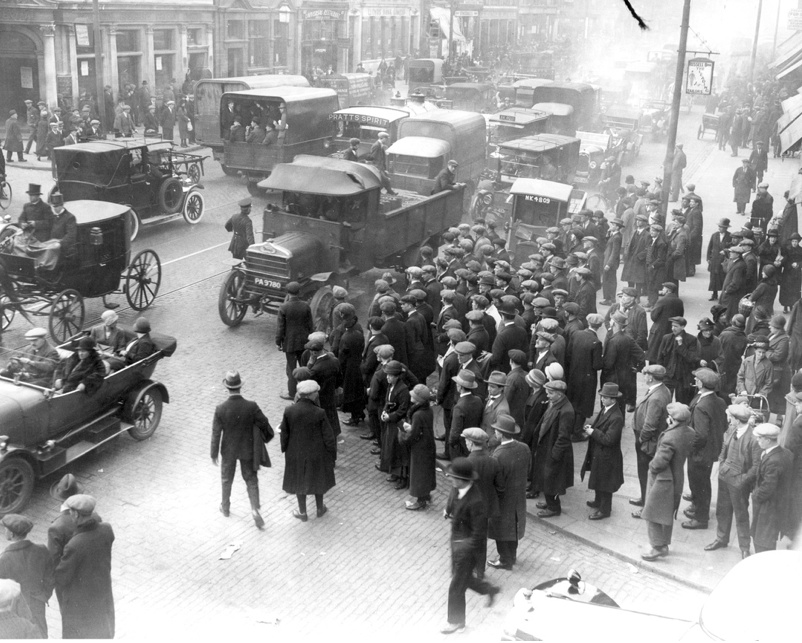
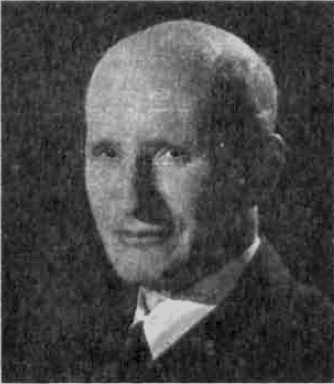
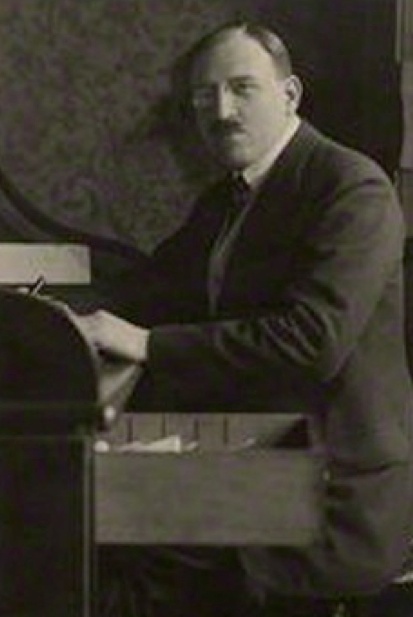
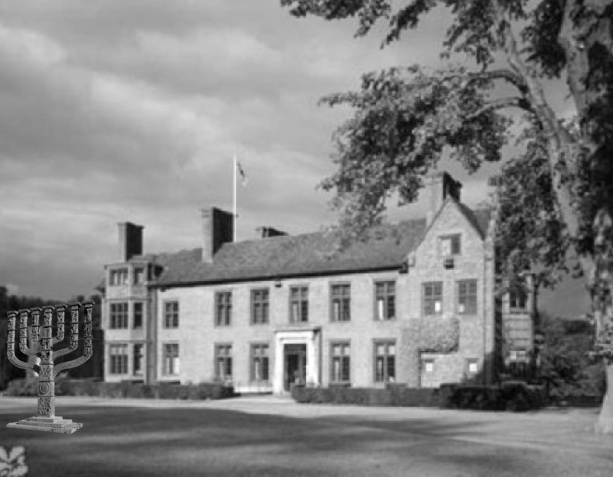
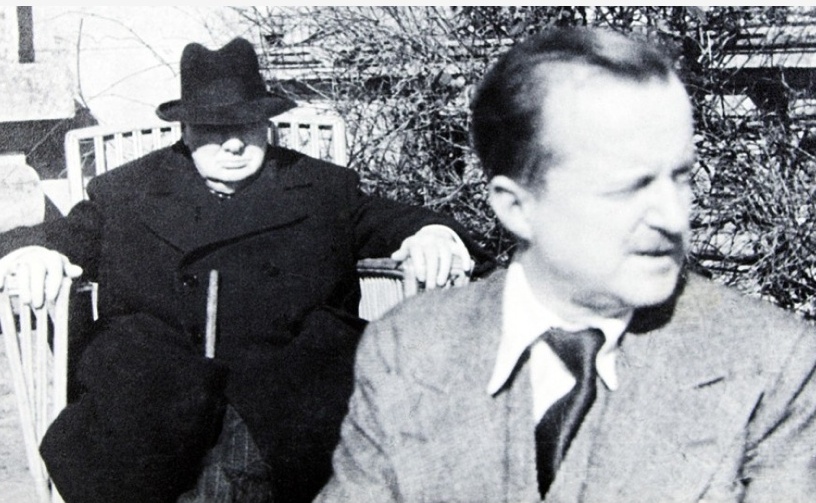
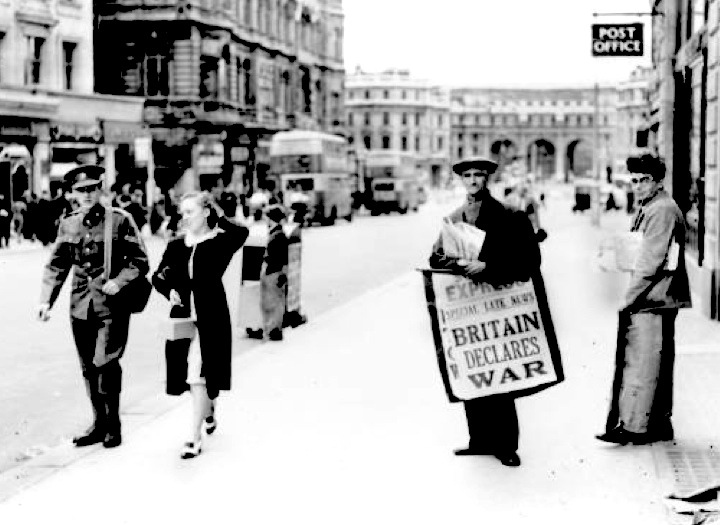
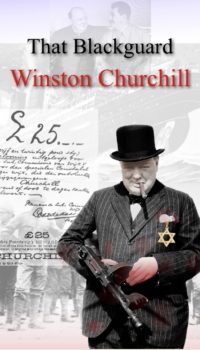
If it was not for Winston Churchill Nazi Germany would have conquered the mainland of Europe, killed nine million Jews, rather than six million, depopulated the Slavic countries, and settled them with Germans.
I am glad that did not happen. God bless Winston Churchill!
It has now been proven that the holocaust is nothing more than lie and hoax, you being a jew should know that better than most, but not to worry one day the jew will be dealt with hope you are around for it.
The Holocaust did happen. I am an Episcopalian. As intelligence becomes more important for out increasingly complex, computer driven economy and technology, the wealth and power of the Jews will increase.
Yes and if you’re not a jew which l don’t believe with your jew surname you are certainly a shabbos goy then but you will face a rope on the day.
Yes and if you’re not a jew which l don’t believe with your jew surname you are certainly a shabbos goy then but you will face a rope on the day.
– Brian Land
————-
Brian Lane,
Engelman is a craft name like Fisher or Goldsmith. Engelmann made angels for German churches. During the Second World War my father removed the last n from his last name because Engelmann seemed too German.
You mention a rope. This is how several enemies of the Jews died.at Nuremberg.
https://iconicphotos.files.wordpress.com/2009/07/nazi_death2.jpg?w=700&h=940
Complete and utter rubbish. You’ve obviously spent a good deal of time reading through the various reams of lies created by Sefton Delmer and co.
Winston Churchill was and always will be the scum of the earth who sent millions to their untimely deaths, not just soldiers, but innocent men, women and children from many nations.
This bloated, vile, shabbos goy was the epitome of the nihilistic, ashkenazim mindset that pervades world politics today. After he was paid for by the zionists he showed what a good little establishment zio-pig he could be, by murdering millions of christians across Europe in a completely unnecessary, fratricidal war.
This is one war criminal that escaped the hangmans noose, although those who sponsored this pale, turgid, closet homosexual, alcoholic are still creating global chaos and will reap what they’ve sown.
I quite agree with you Konrad.
The depressing thing is that if Churchill wasn’t around the nation wreckers would have found a willing and able replacement.
If one wanted land and soil in Europe, then by and large this could only have been done at Russia’s expense…For such a policy, however, there was only one single ally in Europe: England.
– Adolf Hitler, from Mein Kampf, Volume I, Chapter IV, “Munich”
But if we talk about new soil and territory in Europe today, we can think primarily only of Russia and its vassal border states…
the mortal enemy of out nation, France, relentlessly throttles us and robs our strength, we must undertake every sacrifice which may help bring about a nullification of the French drive for European hegemony.
– Adolf Hitler, from Mein Kampf, Volume II, Chapter XIV, “Eastern Orientation or Eastern Policy
We’ll take the southern part of the Ukraine, especially the Crimea, and make it an exclusively German colony. they’ll be no harm in pushing out the population that’there now. The German colonist will be the soldier-peasant…
In the Baltic States, we’ll be able to accept as colonists some Dutch, some Norwegians – and even, by individual arrangement, some Swedes.
– Adolf Hitler, from “Hitler’s Table Talk,” page 16
———-
Adolf Hitler intended to conquer the mainland of Europe, and settle it with Germanics. If not for the courage and talent of Winston Churchill he probably would have succeeded.
Hitler was a coward who prolonged the Second World War long after German defeat was inevitable in order to delay his well deserved date with the hangman.
@In his capacity as first lord of the Admiralty, he devised a plan to bring support to the Russians by opening up the Dardanelles by the army, using mostly colonials, the ANZACs. The attack on Gallipoli…
… was in fact another act of bastardy by Churchill.
From: BREST-LITOVSK,THE FORGOTTEN PEACE, MARCH 1918, by JOHN W. WHEELER-BENNETT, 1938
The author presents the situation of 1915 on the Russian front (p.6):
“The result was a series of desultory and unrelated attempts to negotiate a separate peace with Germany, carried on through financial and commercial agencies, through the King of Sweden, and through the Grand Duke of Hesse, brother of the Tsaritsa. These attempts were aided and abetted by the German agents who poured into Russia and sought to foster the cause of peace by playing upon the nervous sensibilities of the Conservatives, emphasizing the danger of revolution from within and of the betrayal of Russia by her Allies. Britain, it was alleged, was planning to deprive Russia of her legitimate spoils of war by keeping Constantinople for herself and creating a new Gibraltar at the Dardanelles. France and Japan were said to have agreed to this move, the latter at the price of the promise of expansion into Manchuria. This so disturbed the Russian Government that at the Inter- Allied Conference at Chantilly, in November 1915, the
Russian representative advised most earnestly the abandonment of the Gallipoli campaign.”
Pingback: World War I 1916: Britain and France conclude Sykes-Picot agreement – aladdinsmiraclelamp
Pingback: The Long Road To Breaking The Chains Of The Versailles Treaty & The Wilful Deceptions To Incite A New World War – WEARS WAR on the Lies, Liars & WW2
Pingback: Australian Senator Fraser Anning Rightly Calls for a "Final Solution" — TRANSCRIPT - katana17katana17
Pingback: Joel Davis – WWII Revisionism Re-enters the Mainstream – Sep 6, 2024 – Transcript | katana17